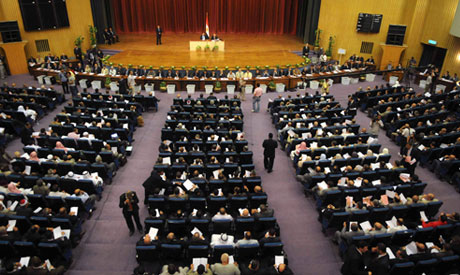
File photo: A general view of the two chambers of parliament meeting to elect the 100 members of the constituent assembly in Cairo (Photo: Reuters)
Egypt's Constitutuent Assembly, tasked with drafting Egypt's constitution, is set to hold its fourth meeting on Monday at 6pm at the Shura Council (parliament's upper house).
The Assembly, the second of its kind in as many months, is chaired by the head of the Supreme Council of the Judiciary, Hossam El-Ghariani.
Members of the Assembly are set to hold an extended meeting to continue discussing the nature of the political system, specifically whether Egypt will follow a presidential, parliamentary or mixed system.
Constitutional law expert Atef El-Banna is set to head this session.
In the last session held on Saturday, the Assembly's spokesperson and independent member of the dissolved parliament, Wahid Abdel-Meguid, announced that there had been a general agreement over establishing the mixed parliamentary-presidential system.
The members are set to discuss the nominations for the five subcommittees of the Assembly: basic principles, rights and freedoms, system of government, regulatory bodies, and drafting committee.
On Tuesday, Ghad Al-Thawra Party head Ayman Nour and Wasat Party head Abul-Ela Madi were elected deputies to El-Ghariani. The Muslim Brotherhood's Amr Darrag was elected secretary-general of the assembly.
The current assembly's fate however remains unclear as it faces challenges in particular from the ruling military council's recently issued constitutional addendum.
Issued on 17 June, on the evening that polls in the presidential race closed, the addendum gives the Supreme Council of Armed Forces (SCAF) the power to dissolve the Assembly if it “encounters obstacles that prevent it completing its work” (Article 60B).
In such a scenario, the military council would be able to form a new assembly in its place, because the parliament, which was in charge of forming the assembly, was dissolved by a court ruling on 14 June.
The first constituent assembly, elected by the Islamist-led parliament last spring, was dissolved when courts rendered it unconstitutional in April.
The first assembly was criticised by many observers due to the predominance of Islamist members (66 out of 100) it contained, and as such being unrepresentative of Egyptian society.
During the negotiations leading up to the formation of the second assembly, a deal was reached between Islamist and non-Islamist parties over the membership ratio, but the non-Islamist figures accused their Islamist counterparts of breaking the deal and attempting to secure a voting majority of Islamists once again.
Short link: